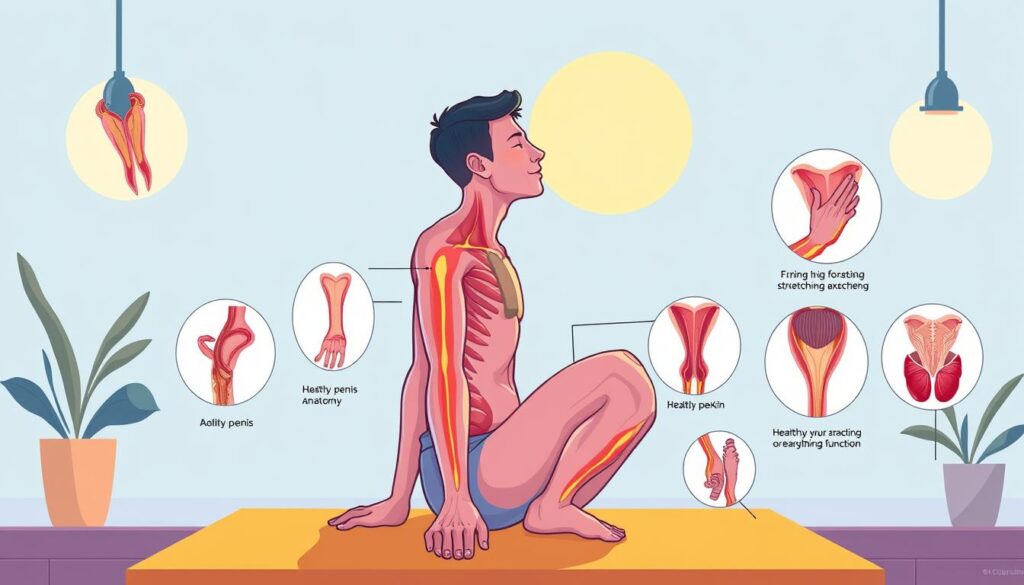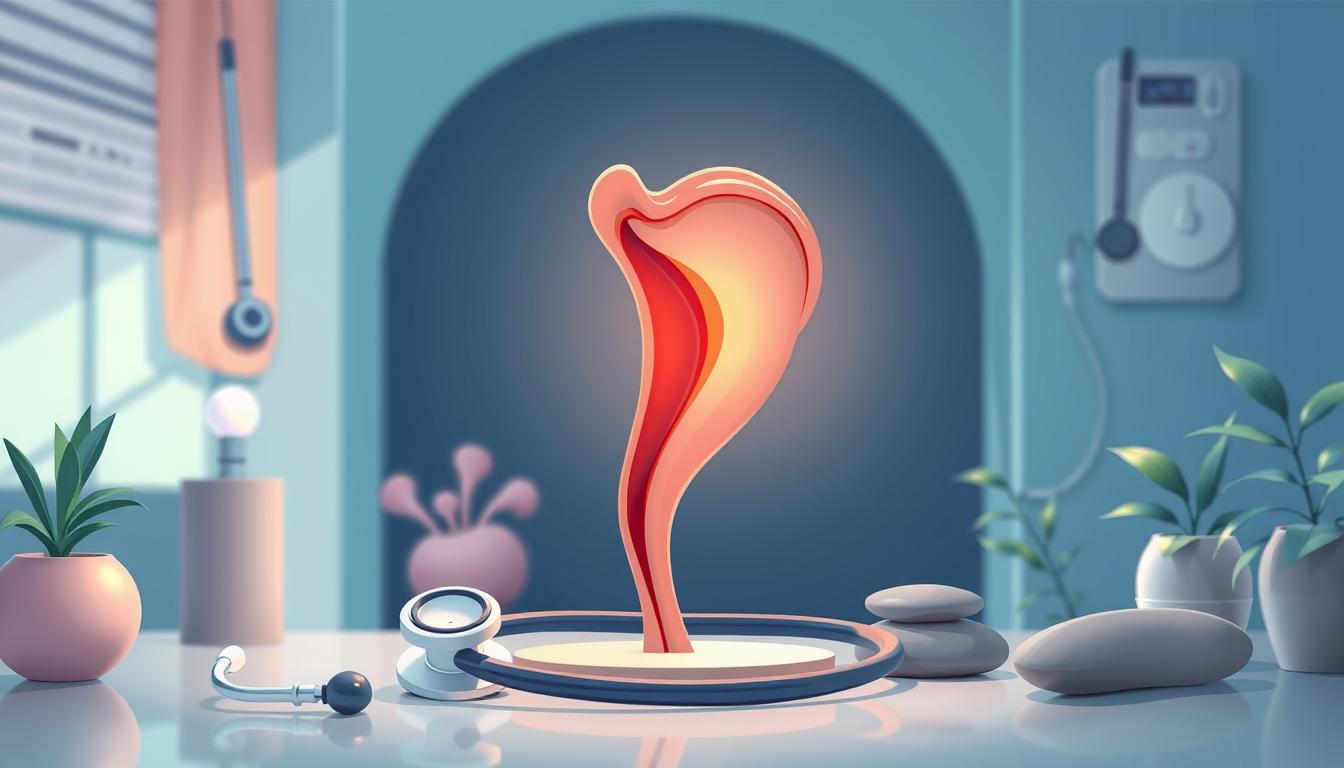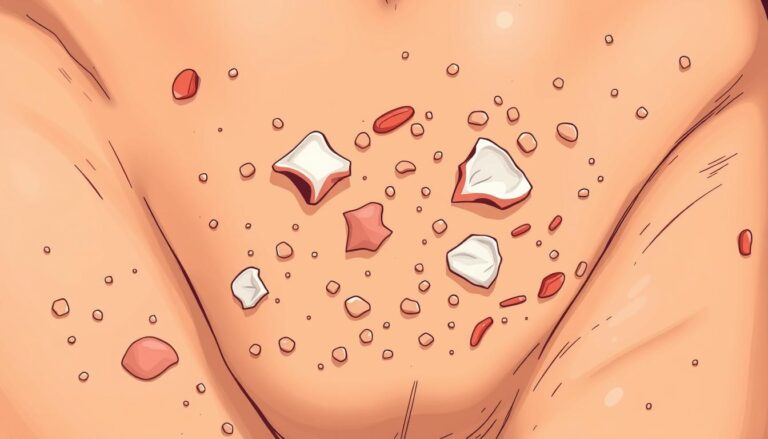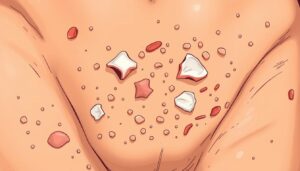Keeping your penis healthy is key for good sex life. Phimosis makes the foreskin too tight, affecting your sex life. Dr. Good Deed, a top urologist, offers expert advice on treating phimosis to keep your penis healthy.
This guide covers many ways to treat phimosis, from creams to surgery. Dr. Good Deed explains each option. You’ll learn how to fix phimosis and keep your penis healthy.
Dr. Good Deed’s tips can help with erectile issues, early ejaculation, or keeping your penis sensitive. His advice can improve your sex life. Let’s look at how to manage phimosis and keep your penis healthy.
What is Phimosis and How Does it Affect Penis Health?
Phimosis is when the foreskin of the penis is too tight. It can’t be pulled back fully. This condition causes discomfort and can affect your sex life. Knowing about phimosis is key to keeping your penis healthy.
Definition and Symptoms of Phimosis
Phimosis mainly affects men who haven’t been circumcised. It happens when the foreskin can’t be pulled back. Symptoms include:
- Pain during urination
- Weaker urinary stream
- Blood in the urine
- Pain during sexual activity
- Foreskin pain or discomfort
- Discharge from the penis
- A white ring at the foreskin opening
Causes of Phimosis and its Impact on Sexual Function
Phimosis can be caused by many things. These include being born with it, infections, or skin conditions. It can also be linked to diabetes. If not treated, phimosis can harm your sex life. It might cause early ejaculation, erectile dysfunction, and other penis health issues.
Non-Surgical Treatment Options for Phimosis
If phimosis is causing you discomfort, there’s a non-surgical way to help. Topical steroid creams and gentle exercises can treat mild to moderate cases. They avoid the need for surgery.
Topical Steroid Creams for Loosening the Foreskin
Using topical steroid creams, like clobetasol propionate, can make the foreskin easier to pull back. These creams reduce inflammation and make the skin more elastic. Research shows they can cure phimosis in 70-80% of cases.
Stretching Exercises to Gently Retract the Foreskin
- Gently pull the foreskin back, stretching it a little at a time, and hold for a few seconds.
- Repeat this process several times a day, gradually increasing the duration and range of motion.
- These exercises can help increase the foreskin’s flexibility and mobility, allowing for easier retraction.
Combining topical steroid creams with stretching exercises can treat phimosis without surgery. Talk to your doctor to find the best treatment for you.

Phimosis Treatment for Healthy Penis
It’s important to treat phimosis to keep the penis healthy and working well. Phimosis makes it hard to pull back the foreskin. This can cause problems like not being able to pee right, infections, and trouble with sex. Luckily, there are ways to fix this and make the penis healthy again.
The main goal of treatment is to make it easy to pull back the foreskin. Doctors use both non-surgical and surgical methods. They choose what’s best for each person to get the best results.
- Topical steroid creams can help soften and loosen the foreskin, allowing for gradual retraction.
- Stretching exercises, under the guidance of a healthcare professional, can also be effective in gently widening the foreskin opening.
- In severe cases, where non-surgical methods are not successful, surgical interventions like circumcision or preputioplasty may be recommended.
By treating phimosis, people can improve their penis health, penile function, and overall sexual health. This makes sex better and helps feel more comfortable and confident with one’s body.
It’s key to get medical advice for phimosis treatment. A doctor can check the condition and suggest the best treatment. This ensures the penis stays healthy and works well.
Surgical Intervention for Severe Cases of Phimosis
When non-surgical treatments don’t work, surgery might be needed for phimosis. Phimosis makes it hard to pull back the foreskin. It can cause health problems if not treated. Circumcision and preputioplasty are two main surgeries for phimosis.
Circumcision: Procedure and Recovery
It removes the foreskin, showing the penis head. This helps with problems like hard peeing, infections, and painful erections.
The recovery takes a few weeks. The penis must stay clean. It will heal slowly.
Preputioplasty: An Alternative to Circumcision
Preputioplasty is for keeping the foreskin. It makes a small cut in the foreskin for better pulling back. It’s a good choice for phimosis without removing the foreskin.
Circumcision and preputioplasty are common surgeries for phimosis. They help with penis health. Talk to a doctor to choose the best surgery for you.
Maintaining Good Penile Hygiene After Phimosis Treatment
Keeping your penis clean is key after phimosis treatment. This condition makes the foreskin too tight. It’s important to care for your penis to avoid future problems.
Start by washing your penis and foreskin with mild soap and water. Stay away from harsh cleansers. They can hurt your skin. Dry your penis and foreskin well to keep them clean and dry.
Don’t pull back your foreskin too hard. This can hurt. Your doctor might suggest gentle stretching to help. Always follow their advice for the best results.
Good penis hygiene and following treatment care can prevent many issues. This includes skin problems and infections. Taking care of your penis helps it heal well after phimosis treatment.
Impact of Phimosis on Sexual Health and Relationships
Phimosis is when the foreskin can’t be pulled back fully. It affects a person’s sexual health and relationships. It can cause early ejaculation, erectile problems, and less pleasure during sex.
The psychological effects of phimosis are big too. They include anxiety, shame, and a bad view of oneself. These feelings make relationships harder. It’s important to deal with these feelings to improve penile health and intimacy.
Addressing Psychological Effects of Phimosis
Talking openly with your partner and getting phimosis relationships counseling is key. It helps manage the mental side of phimosis. This way, you can better your sexual health and keep your relationship strong.
Don’t forget, getting medical help and looking into treatments can solve phimosis’s physical and mental problems. It makes for a better, more enjoyable sex life.
Preventing Phimosis: Tips for Foreskin Care
Good foreskin care is key to stop phimosis. This is when the foreskin gets too tight to pull back. Simple steps in your daily life can keep your penis healthy and avoid phimosis problems.
Dr. Good Deed’s Clinic has some tips to prevent phimosis:
- Wash the foreskin and around it with mild soap and warm water during baths. Don’t scrub too hard or use harsh cleaners.
- Slowly pull back the foreskin while bathing. This keeps it moving well and stops it from sticking.
- Fix any infections or irritation right away. They can lead to phimosis. See a doctor if you have pain, swelling, or discharge.
- Wear loose, breathable underwear. It helps keep the area clean and stops moisture or friction problems.
Adding these foreskin care steps to your day can help prevent phimosis. It also keeps your penis healthy. Taking care of your foreskin is important for a healthy penis.
When to Seek Medical Advice for Phimosis
If you have trouble pulling back your foreskin, feel pain, or have discomfort when you pee or have sex, see a doctor. A urologist or primary care physician can check you, figure out what’s wrong, and suggest the best treatment. This is key for your penis health.
It’s important to catch phimosis early and get help fast. If you wait too long, it could get worse. A doctor can find out why you have phimosis and help you choose the right treatment. This way, you can keep your penis healthy and feel good.
- Seek medical advice if you experience difficulty retracting the foreskin, pain, or discomfort during urination or sexual activity.
- A healthcare provider can perform a physical exam, diagnose the condition, and recommend the best treatment plan.
- Addressing phimosis early is important to prevent potential complications and maintain healthy penis function.
Don’t be shy about talking to a doctor about your penis health. They can help you deal with phimosis and keep your genital area healthy.
Conclusion
Phimosis can really hurt your penis health and sex life if not treated. But, with the right approach, you can fix it. This includes both non-surgical and surgical methods.
Keeping your penis clean and getting medical help when needed is key. Knowing how phimosis affects your sex life and relationships is also important. There are many treatments, like creams and surgery, to help you.
It’s very important to get help from a doctor. The way phimosis is treated can change with age and other factors. With the right treatment, you can beat phimosis and have a healthy sex life.
FAQ
What is phimosis and how does it affect penis health?
Phimosis is when the foreskin is too tight. It can’t be pulled back fully. This causes pain, makes it hard to pee, and affects sex life. It can harm penis health and sex life.
What are the causes of phimosis and its impact on sexual function?
Phimosis can be caused by being born with it, poor hygiene, or infections. If not treated, it can hurt sex life. It might cause early ejaculation, trouble getting an erection, and more.
What are the non-surgical treatment options for phimosis?
For mild to moderate phimosis, creams and exercises can help. Steroid creams soften the foreskin. Gentle stretching exercises improve mobility and reduce symptoms.
What are the surgical intervention options for severe cases of phimosis?
For severe cases, surgery might be needed. This includes removing the foreskin (circumcision) or a procedure called preputioplasty. It makes the foreskin easier to pull back.
How important is maintaining good penile hygiene after phimosis treatment?
Keeping the penis clean is key after phimosis treatment. Wash gently with mild soap and water. Dry well to avoid infections or irritation.
How can phimosis impact sexual health and relationships?
Phimosis can hurt sex life and relationships. It can cause early ejaculation, trouble getting an erection, and less satisfaction. Talking openly and seeking help can improve sex life and relationships.
What steps can be taken to prevent the development of phimosis?
To prevent phimosis, care for the foreskin. Clean it gently, avoid harsh soaps, and slowly pull back the foreskin during baths. Good hygiene and quick action on infections can also help.
When should someone seek medical advice for phimosis?
See a doctor if you have phimosis symptoms like trouble pulling back the foreskin, pain, or discomfort when peeing or having sex. A doctor can diagnose and suggest treatment.
















Leave a Comment